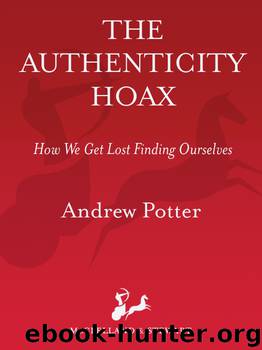The Authenticity Hoax by Andrew Potter

Author:Andrew Potter [Potter, Andrew]
Language: eng
Format: epub
ISBN: 978-1-55199-347-8
Publisher: McClelland & Stewart
Published: 2010-09-05T04:00:00+00:00
What does it take to turn an honest, hardworking young student into a lazy, lying cheat? Some educators suggest that plagiarism is a consequence of the increasingly competitive nature of university. The pressure is on, the stakes are climbing, so there is a greater incentive to cheat. Others suggest that students can’t be blamed for merely following the lead of the culture at large. After all, some of the most successful people out there have been caught stealing from others on occasion, and their continued success indicates that they haven’t exactly been given a failing grade by society. So there is probably not much to be gained by lecturing students on academic values or telling them “they are only cheating themselves.” The fact is, plagiarism is so rampant now that it is close to becoming normalized, where students (and, sadly, even profs) no longer see it as a big deal. If students are increasingly dishonest, perhaps it is because the type of dishonesty that plagiarism involves is increasingly tolerated by society.
But the easiest and most obvious explanation for the apparent epidemic of plagiarism is technology. The mass digitization of texts, combined with keyword-based search engines such as Google, has made helping yourself to the works of others a piece of cake. In the old days, if you wanted to copy something out of an obscure journal or book, eventually you had to type it in by hand, which would take almost as much effort as writing something of your own. The digitization of our culture has transformed writing from a hunt-and-peck business into a cut-and-paste affair. The flip side of this development is that the Internet has also made it far easier to catch plagiarists. Back in the olden days, if a professor suspected a student of cheating, he or she would have to dig through the library by hand, or pass the suspect work around to colleagues. Now, if a passage seems out of place in a student’s paper, or if a section in a book seems familiar, you can just type a line or two into Google and — presto — you have your smoking gun.
But that explains only why it is easier to plagiarize, not why so many people choose do it. Is it possible that students and professional writers alike are becoming more dishonest? Despite the evidence, I think the answer is no. It is important to recognize that honesty is not something some people possess and others lack, the way some people have blue eyes and others don’t. Honest is an adjective that applies to individual actions or statements that are elicited (or not) in a way that is highly sensitive to social context and to expected risks and anticipated rewards.
The point is that no one is 100 per cent honest all the time; everyone is disposed to lie or hide the truth in certain circumstances. Indeed, various studies suggest that people actually lie a lot — telling three or four explicit lies every day, not counting the small lies we tell ourselves.
Download
This site does not store any files on its server. We only index and link to content provided by other sites. Please contact the content providers to delete copyright contents if any and email us, we'll remove relevant links or contents immediately.
| Anthropology | Archaeology |
| Philosophy | Politics & Government |
| Social Sciences | Sociology |
| Women's Studies |
The remains of the day by Kazuo Ishiguro(8999)
Tools of Titans by Timothy Ferriss(8396)
Giovanni's Room by James Baldwin(7346)
The Black Swan by Nassim Nicholas Taleb(7129)
Inner Engineering: A Yogi's Guide to Joy by Sadhguru(6796)
The Way of Zen by Alan W. Watts(6614)
The Power of Now: A Guide to Spiritual Enlightenment by Eckhart Tolle(5782)
Asking the Right Questions: A Guide to Critical Thinking by M. Neil Browne & Stuart M. Keeley(5775)
The Six Wives Of Henry VIII (WOMEN IN HISTORY) by Fraser Antonia(5515)
Astrophysics for People in a Hurry by Neil DeGrasse Tyson(5190)
Housekeeping by Marilynne Robinson(4447)
12 Rules for Life by Jordan B. Peterson(4304)
Ikigai by Héctor García & Francesc Miralles(4274)
Double Down (Diary of a Wimpy Kid Book 11) by Jeff Kinney(4272)
The Ethical Slut by Janet W. Hardy(4253)
Skin in the Game by Nassim Nicholas Taleb(4249)
The Art of Happiness by The Dalai Lama(4130)
Skin in the Game: Hidden Asymmetries in Daily Life by Nassim Nicholas Taleb(4007)
Walking by Henry David Thoreau(3962)
